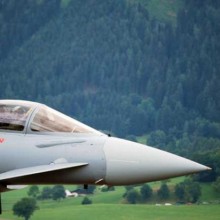BY THE END OF NOVEMBER 2010, THE WORLD KNEW WHERE NATO WAS HEADING
By the end of November 2010, the world knew how NATO pictured its own future. That’s when heads of state and government met in Brussels to plan for NATO’s 2010 summit in Lisbon, and to announce the organization’s new strategic concept.
To remain a global player, NATO must do four things....
NATO last did this in April 1999, during the Kosovo war. Of course, much has changed since then to the Alliance that was designed to protect Western Europe from Soviet attack. In 1999, an ‘out-of-area’ mission meant humanitarian intervention in the Balkans. Today, it means fighting al Qaeda in Afghanistan, pirates off Somalia, or computer hackers in China. If NATO focuses increasingly on global challenges, it can remain important in global affairs. If NATO re-focuses on Europe, however, it will become little more than a diplomatic talk-shop far from the real action around the world.
To be successful going forward, NATO needs to do at least four things. First, it must recognize that collective defense encompasses a much broader range of threats than during the Cold War. Second, NATO will have to expand its cooperation with the European Union, which has significant resources to manage non-military threats to states and societies. Third, it needs to continue to develop better relations with Russia, for example, by pursuing joint collaboration on missile defense. Finally, the Alliance should strengthen its partnerships with non-European democracies, especially in East Asia, in order to sustain its legitimacy when acting outside the North Atlantic area
But doing those things won’t be easy. The core of the alliance has always been Article V of the original treaty, promising a collective effort to defend against “armed attack,” which meant thwarting a Soviet invasion of Western Europe. And many Europeans worry that the alliance is shifting too far from that mission; many eastern Europeans, in particular, want NATO to protect them against a resurgent Russia.
Also, the mission in Afghanistan has exposed NATO’s military shortcomings. Few alliance members are able to engage in serious combat operations, leading U.S. Secretary of Defense Robert Gates to complain about a “two-tiered alliance” of those that can fight and those that cannot. European unwillingness to invest heavily in defense will severely constrain their ability to contribute to future alliance operations.
Many have argued that failure in Afghanistan would mean the end of NATO. But NATO is less likely to collapse than it is to grow increasingly irrelevant to U.S. military strategy. In addition to the threat from the broader Middle East, American planners will become increasingly worried about security challenges in the Western Pacific, an area where the Europeans see little strategic interest.
That’s because Americans are thinking more globally. They see NATO addressing threats that include terrorism, proliferation of weapons of mass destruction, and cyber warfare, which largely emanate from the broader Middle East, Asia and Africa. An alliance focused only on traditional security challenges arising from within Europe will be of little consequence in global affairs.
By James Goldgeier
Professor of Political Science
George Washington University
RELATED MATERIAL FOR THE WEEK OF OCTOBER 11
Lord Ismay, the first Secretary General of the North American Treaty Organization (NATO), once declared that NATO’s purpose was “to keep the Russians out, the Americans in, and the Germans down.” Formed in 1949 to defend Europe in the face of a growing Soviet threat, NATO ultimately succeeded in accomplishing all three goals: by the fall of the Berlin Wall, the organization had outlived the Soviet Union; committed formerly isolationist Americans to the defence of Europe; and tied Germany’s security to that of Western Europe as a whole.
In the post-Cold War era, its mandate outdated, NATO was faced with the challenge of defining a niche for itself in an increasingly complex global system. In the 1990s, NATO became a key player in an emerging global collective security and humanitarian interventionist framework, undertaking operations in the Balkans in the early 1990s and in Kosovo in 1999. In the post-9/11 era, NATO took over American operations in Afghanistan and took part in training forces in Iraq.
In the coming months, NATO foreign and defence ministers, as well as NATO leaders, will meet to discuss current and imminent challenges facing the organization. Policy experts, based in Washington, began a NATO review process in early 2010 in hopes of drafting a new “strategic concept,” which will be presented at the November 2010 NATO Leaders’ Summit in Lisbon Portugal. This concept will likely address, among other things: NATO’s outdated Charter, expanding NATO membership, and the possibility of a role for Russia. NATO foreign and defence ministers will meet on October 14th, 2010, Their agenda apparently will include discussion of the new “strategic concept,” as well as confirming the agenda for the leaders’ summit in November.
RELATED SITES AND MATERIALS
- In this video, former US secretary of state Madeleine K. Albright discusses the evolution of transatlantic relations and the relevance of NATO today.
- Global Europe has organized an online colloquiumto discuss Albright’s question about the future of NATO.
- Featured on World Politics Review, Judah Grunstein’s blog entryevaluates NATO in terms of its relevancy and usefulness.
- NATO’s Media Libraryholds footage of NATO meetings and exercises, as well as a number of short videos presenting the Alliance or aspects of NATO policy.
- In this video, NATO Secretary General, Anders Fogh Ramussen, comments on the future of the transnational alliance, as well as the challenges it will face.
- In The New NATO: Changed Priorities Reflect This Decade’s Coming Security Challenges, Niruban Balachandran discusses the role of NATO in today’s transformed international security environment.
- In PolicyNet Blog, Matthew Bondy discussesa new course of action for NATO proposed by Zbigniew Brzezinski, former NSA to Jimmy Carter.
- Paul Ingram, Executive Director of the British American Security Information Council talksto NPT TV about the NATO Strategic Concept review and its meaning for the future of the alliance.
